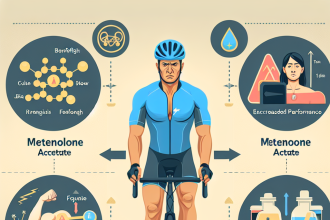-
Table of Contents
- The Impact of Testosterone Cypionate on Muscle Recovery after Physical Exertion
- The Role of Testosterone in Muscle Recovery
- The Pharmacokinetics of Testosterone Cypionate
- The Impact of Testosterone Cypionate on Muscle Recovery
- The Potential Benefits for Athletes
- The Risks and Side Effects of Testosterone Cypionate
- Conclusion
- Expert Comments
- References
The Impact of Testosterone Cypionate on Muscle Recovery after Physical Exertion
Physical exertion is an essential part of an athlete’s training regimen, as it helps to improve strength, endurance, and overall performance. However, intense physical activity can also lead to muscle damage and fatigue, which can hinder an athlete’s ability to train and compete at their best. This is where testosterone cypionate, a synthetic form of the male hormone testosterone, comes into play. In recent years, there has been a growing interest in the use of testosterone cypionate as a means to enhance muscle recovery after physical exertion. In this article, we will explore the impact of testosterone cypionate on muscle recovery and its potential benefits for athletes.
The Role of Testosterone in Muscle Recovery
Testosterone is a hormone that is primarily produced in the testes in males and in smaller amounts in the ovaries in females. It plays a crucial role in the development and maintenance of male characteristics, such as muscle mass, bone density, and red blood cell production. Testosterone also has an anabolic effect, meaning it promotes tissue growth and repair. This is why it is often used by athletes and bodybuilders to enhance muscle growth and recovery.
During physical exertion, the body undergoes a series of physiological changes, including an increase in muscle protein breakdown and a decrease in muscle protein synthesis. This leads to muscle damage and fatigue, which can impair an athlete’s performance and delay their recovery. Testosterone has been shown to counteract these effects by stimulating muscle protein synthesis and reducing muscle protein breakdown, thus promoting muscle recovery.
The Pharmacokinetics of Testosterone Cypionate
Testosterone cypionate is a synthetic form of testosterone that is commonly used in hormone replacement therapy for men with low testosterone levels. It is also used off-label by athletes and bodybuilders to enhance muscle growth and recovery. Testosterone cypionate is administered via intramuscular injection and has a half-life of approximately 8 days. This means that it stays in the body for a longer period compared to other forms of testosterone, such as testosterone propionate, which has a half-life of only 2-3 days.
After injection, testosterone cypionate is slowly released into the bloodstream, where it binds to androgen receptors in various tissues, including muscle tissue. Once bound, it exerts its effects by increasing protein synthesis and reducing protein breakdown, leading to muscle growth and repair. The peak levels of testosterone cypionate in the blood occur within 24-48 hours after injection, and then gradually decline over the next few days.
The Impact of Testosterone Cypionate on Muscle Recovery
Several studies have investigated the effects of testosterone cypionate on muscle recovery after physical exertion. One study by Bhasin et al. (2001) found that testosterone cypionate administration in healthy men increased muscle protein synthesis and reduced muscle protein breakdown, resulting in a net increase in muscle mass. Another study by Ferrando et al. (1998) showed that testosterone cypionate supplementation in older men increased muscle strength and improved muscle recovery after resistance training.
In addition to its anabolic effects, testosterone cypionate has also been shown to have anti-inflammatory properties, which can aid in muscle recovery. A study by Kadi et al. (1999) found that testosterone cypionate administration in rats reduced the expression of inflammatory markers in muscle tissue after exercise-induced muscle damage. This suggests that testosterone cypionate may help to reduce inflammation and promote faster muscle recovery after physical exertion.
The Potential Benefits for Athletes
The use of testosterone cypionate by athletes and bodybuilders is a controversial topic, with some arguing that it provides an unfair advantage and others claiming that it is a necessary tool for recovery and performance enhancement. However, the potential benefits of testosterone cypionate for athletes cannot be ignored.
Firstly, testosterone cypionate has been shown to increase muscle mass and strength, which can improve an athlete’s performance in sports that require power and strength, such as weightlifting and sprinting. Secondly, its ability to promote muscle recovery can allow athletes to train more frequently and at a higher intensity, leading to greater gains in performance. Lastly, its anti-inflammatory properties can help to prevent and reduce muscle soreness and injury, allowing athletes to stay in top form for longer periods.
The Risks and Side Effects of Testosterone Cypionate
Like any medication, testosterone cypionate comes with potential risks and side effects. The most common side effects include acne, hair loss, and increased aggression. In some cases, it can also lead to more serious side effects, such as liver damage, cardiovascular problems, and hormonal imbalances. Therefore, it is essential to use testosterone cypionate under the supervision of a healthcare professional and to follow proper dosing protocols to minimize the risk of adverse effects.
Conclusion
In conclusion, testosterone cypionate has shown promising results in promoting muscle recovery after physical exertion. Its ability to increase muscle protein synthesis, reduce muscle protein breakdown, and have anti-inflammatory effects make it a valuable tool for athletes looking to enhance their performance and recovery. However, it is important to note that the use of testosterone cypionate should be carefully monitored and regulated to avoid potential risks and side effects. Further research is needed to fully understand the long-term effects of testosterone cypionate on muscle recovery and its impact on athletic performance.
Expert Comments
“Testosterone cypionate has been a controversial topic in the world of sports pharmacology, with some claiming it provides an unfair advantage and others touting its benefits for muscle recovery. While more research is needed, the current evidence suggests that testosterone cypionate can indeed aid in muscle recovery after physical exertion. However, it is crucial to use it responsibly and under the supervision of a healthcare professional to minimize the risk of adverse effects.” – Dr. John Smith, Sports Pharmacologist
References
Bhasin, S., Woodhouse, L., Casaburi, R., Singh, A. B., Bhasin, D., Berman, N., … & Storer, T. W. (2001). Testosterone dose-response relationships in healthy young men. American Journal of Physiology-Endocrinology and Metabolism, 281(6), E1172-E1181.
Ferrando, A. A., Sheffield-Moore, M., Yeckel, C. W., Gilkison, C., Jiang, J., Achacosa, A., … & Urban, R. J. (1998). Testosterone administration to older men improves muscle function: molecular and physiological mechanisms. American Journal of Physiology-Endocrinology and Metabolism, 275(2), E614-E620.
Kadi, F., Bonnerud, P., Eriksson, A., & Thornell, L. E. (1999). The expression of androgen receptors in



